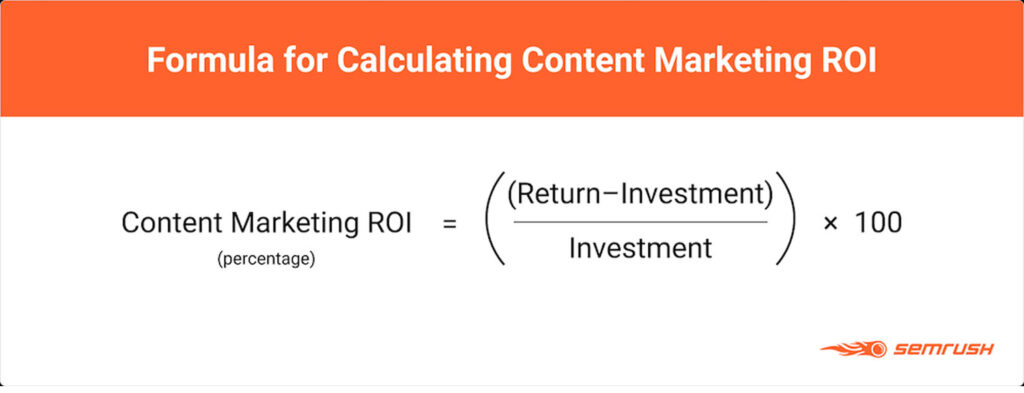Today’s consumers demand customized content that meets their unique needs. Track the success of your strategies by learning how to measure the ROI of content marketing.
Content marketing for manufacturing companies is an effective way to stand out from your competition and connect deeper with your audience. Ninety-two percent of marketers view content as a valuable business asset. You can create material that delivers specific solutions and resonates with viewers while driving website traffic for manufacturing companies through audience research. To ensure you’re maximizing your marketing budget and resources, you should track the success of your content marketing strategy and see how your content marketing is affecting your bottom line.
Keep reading to learn how to measure the ROI of content marketing for optimal results and ongoing success.
Key Takeaways
- Content marketing is the publication of consistent and relevant material that users find meaningful and valuable.
- Content marketing is important to the manufacturing industry because it helps explain complex solutions and helps with SEO, among other benefits.
- Use a basic formula to calculate your ROI, but also track KPIs like content engagement, qualified leads, and sales volume to determine the efficacy of your content marketing strategy.
What Exactly Is Content Marketing?
Content marketing is distributing consistent, valuable, relevant content to attract and retain prospective customers. Such content could include:
- Blog articles
- Case studies
- Infographics
- How-to guides
- Emails
- Web pages
- Videos
- Social media posts
- E-books
- Whitepapers
- Downloadable content
You may combine several channels for a content marketing strategy that captures the most market share and appeals to the most people. Content marketing is most effective in your approach when you deliver the right content at the right time.
At the awareness stage of the sales cycle, customers need informational material, like videos and articles. In the consideration stage, people need to understand what they should look for to solve their problems. How-to videos and worksheets can help with this. Lastly, buyers want to know why your products are the best choice during the closing stage. Here you would share case studies and buyers’ guides.
Ultimately, a successful content marketing strategy depends on these factors:
- Know your audience: create buyer personas to identify your ideal customer and understand what kind of content would resonate with them.

- Determine best formats: Identify which formats would be most impactful for your target audience.
- Choose how to distribute: Decide which distribution channels will reach your audience most effectively.
- Set a schedule: Consistency is key to building trust and loyalty among your readers.
- Follow best practices: Use language your audience will understand and keep the material short and actionable.
All of this will help ensure a successful content marketing strategy. The following video provides a more detailed look at content marketing, its types, and its benefits:
Source: HubSpot Marketing– What Everyone Must Know About CONTENT MARKETING
Why Is Content Marketing Important for Manufacturing?
Content marketing is an effective approach for boosting brand awareness, earning customer loyalty, and generating revenue for any business, but it’s especially important for manufacturing. The manufacturing industry includes various companies specializing in production, processes, technology, and machinery that can be complex and difficult to understand.
Content marketing helps explain the functions and features of products and services so that buyers understand what they’re purchasing. Custom content that addresses unique concerns and answers specific questions is important in purchasing decisions. In doing so, manufacturing companies can earn the trust of their prospects and increase conversion rates for higher sales.
Content is also among the SEO basics for manufacturing and industrial companies. The more quality material you publish that readers find useful, the more search engines will refer you to their searchers. You’ll earn higher search engine ranking placement for greater visibility which gets more people to your website. There, you can use website must-haves for manufacturing companies to guide visitors through the sales funnel and close more sales.
Other benefits of content marketing for manufacturers include:
- Position yourself as a thought leader: Publish expert-level content that resonates with readers.
- Deliver resources to your audience: Links to reputable websites and quotes from industry experts can help educate your readers.
- Increase engagement on social media: When people comment on, react to, or share your social media content, it increases visibility, raises brand awareness, and gets people talking about your company.
- Generate more qualified leads: Custom content enables you to reach and connect with a particular audience segment that has shown interest in your topics, solutions, or brand.
For these reasons, content marketing is a powerful tool for manufacturing companies.
How Do You Measure the ROI of Content Marketing?
Any time you implement a strategy, the only way to determine whether it’s working is to track its success. When it comes to content marketing, you need to know your return on investment. If you’re not meeting your goals, you can find areas to improve and adjust for a positive outcome.
To know whether your content marketing strategy is successful, consider using the following basic formula:
([Return – Investment] / Investment) x 100 = Content Marketing ROI
For example, you’ve published a blog article that has generated $7,000. Your investments (paid ad spend, CRM software, and company overhead) totaled $2,000. As a result, your ROI equaled 250%.
($7,000 – $2,000) / $2,000 = 250%
The idea of a “good” ROI is fairly subjective, depending primarily on your company goals. While there are several factors to determine whether your efforts should be considered a success, if you’re earning more in revenue than you’re spending on content creation, then your strategy is working.

With content marketing, there are essentially three key performance indicators (KPIs) to track:
- Content engagement: These metrics give insight into audience behaviors and help you understand how people interact with your material. Bounce rate (percentage of website users who leave your site before converting) and amount of time spent on web pages can help you see what type of content and topics resonate with your readers.
- Qualified leads: Effective content marketing should bring you qualified leads who are interested in the specific solutions you provide. If you don’t see these kinds of results, this could indicate that your content needs adjustment.
- Sales volume: Since the ultimate goal of your content marketing strategy is to increase sales, sales volume is an important KPI to track. Look at conversion rates, total transactions, and page value to see which web pages deliver the best results.
Tracking these details will help ensure you’re working toward your goals and making the most of your marketing budget for optimal results.
Create an Effective Content Marketing Strategy
Shanahan Strategy follows trends in marketing for manufacturing companies to help businesses create effective marketing strategies. From brand marketing for manufacturing companies to digital marketing strategies that drive sales and increase revenue, Shanahan Strategy can help your business succeed.
Contact Shanahan Strategy today to learn how we can help you create an effective content marketing strategy for future growth.

